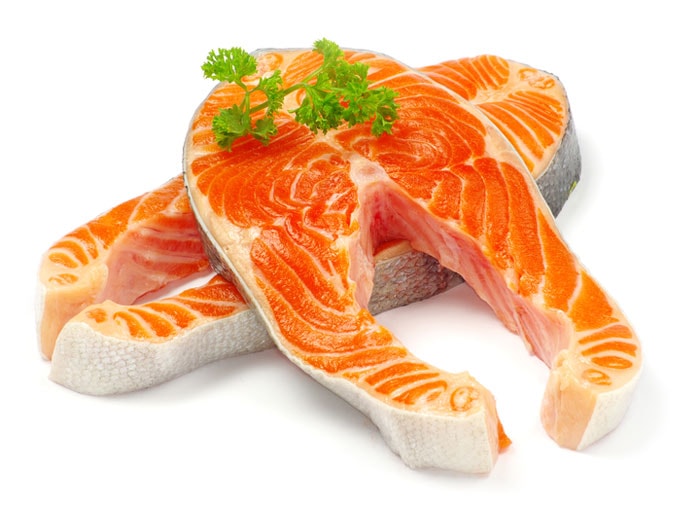
Written By: Christina Newberry
Reviewed By: Gloria Tsang, RD
Title: Registered Dietitian
Last Updated on:

Salmon is quite simply one of the healthiest foods you can eat. It’s great for light but substantial meals, especially if you’re trying to reduce your meat intake, and you can eat it in a wide variety of ways, from sushi to canned to grilled to baked. The American Heart Association recommends eating at least two servings of fish a week, particularly fatty fish like salmon. Let’s take a look at the nutrition data to find out why!

High cholesterol! This term seems to be highly used when dealing with today’s health topics! It is the yellowish material in your arteries which narrows the blood vessels. But they are not all bad for you. You can lower the bad type of cholesterol (LDL – low density lipoprotein) and increase the good type of cholesterol (HDL – high density lipoprotein) by altering your diet. LDL is responsible for clogging your blood vessels and HDL helps to “exile” the LDL to the liver where LDL is “destroyed”. Hence it is beneficial to have higher level of HDL and less LDL in your blood.
The omega-3 fatty acids found in salmon help to boost HDL (good) cholesterol and lower LDL (bad) cholesterol. DHA, a particular type of omega-3 acid, has been shown to be particularly important in lowering cholesterol and improving heart health. Salmon is one of the best food sources of DHA, with 1,000 to 1,500 mg per 3 oz serving.
Omega-3 fatty acids found in salmon is an excellent source to boost up HDL in your blood stream. Omega-3 fatty acid is, indeed, a type of polyunsaturated fatty acids which can only be supplied by food sources. A study chaired by Gary J. Nelson, Ph.D., of the U.S. Dept of Agriculture’s Western Human Nutrition Research Center in San Francisco, showed that HDL increased by 10% by just eating 20 days of a high salmon diet!
Moderation is the key. Include salmon (or other fish with high omega-3 content such us sardines and tuna) to your meals occasionally and enjoy its health benefits.
Salmon oil supplements are available on the market. Check with your doctor before consuming these pills as a single pill is more concentrated in Omega 3 fatty acids than 1 serving of salmon.
Caution: Do not take salmon oil supplements if you are taking a blood thinner drug as salmon oil supplements may further thin your blood.
With its high content of protein, iron, and Vitamin B12, salmon can help to boost athletic performance. The omega-3s in salmon may be beneficial for intestinal heath, and may have anti-inflammatory effects.
There are many species, and they all offer something a little different:
Farmed salmon contains more PCB contamination than wild salmon. Further, some environmentalists are concerned about the effects fish farming has on the environment. Look for wild salmon or farmed salmon raised in contained on-shore pens. For more info on this, please read Farmed Salmon vs. Wild Salmon.
When buying fresh salmon, look for fish that is firm and moist and that does not smell “fishy.”
Alumni: University of Victoria – Christina Newberry is a writer and editor whose work has appeared in national and local magazines and newspapers. With a Bachelor’s degree in English and Anthropology from the University of Victoria and a Journalism Certificate from Langara College, Christina brings keen curiosity and the love of a good story to her work with HealthCastle.com.
Christina is a passionate traveler and urban gardener with an interest in vegetarian eating and making good, tasty food from scratch. Sharing lessons learned from her own experiences, Christina writes about lifestyle topics for HealthCastle, with a focus on eating well at home and on the road.
cholesterol, dha, farmed salmon, healthy every month, heart smart, omega-3, salmon, wild salmon